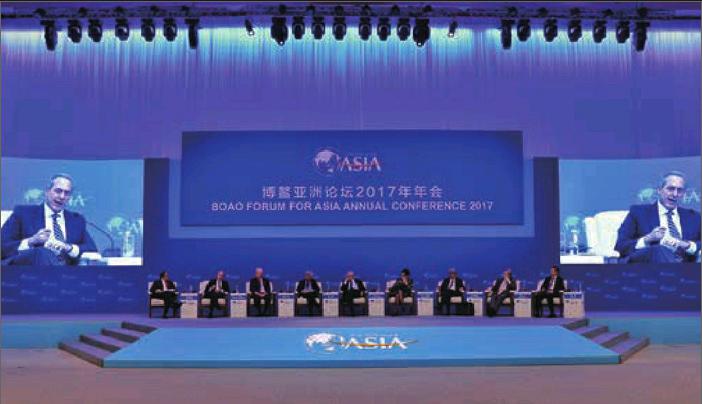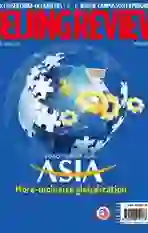ALL ROADS LEAD TO ASIA
2017-04-24

Boao Review: This years BFA conference was held under unique circumstances. Last year the United Kingdom decided to leave the European Union and the United States elected a new president who advocates anti-globalization and protectionism. What message does this years conference convey?
Zhou Wenzhong: The theme of this years conference is Globalization and Free Trade: The Asian Perspectives. Centering on this theme, sessions of this years annual conference are on four major topics: globalization, growth, reform and the new economy. A total of 44 sessions were held, and “more inclusive globalization” was the emphasis of this years meeting.
The Silk Road Economic Belt and 21stCentury Maritime Silk Road Initiative (Belt and Road Initiative) was also prominent in discussions. State leaders and senior government officials from countries along the Belt and Road held dialogues on the issue. These talks also included Chinese ministers and entrepreneurs and their counterparts from countries along the Belt and Road. How to stimulate growth was also a topic that governments and business leaders from all countries were concerned about.
You said although globalization has some inadequacies, it will never be resisted or reversed by any force. Why are you so confi dent of that assumption?
Globalization keeps expanding as an objective trend, rather than a subjective wish. Starting from trade, globalization grows rapidly to investment and free flow of human resources. Opposition to internationalization mainly comes from two types of countries: those that lose out because of it and those that benefit from it less than others. There is also opposition from non-economic advocates, such as environmental protection and labor standards.
Generally speaking, globalization has made tremendous contributions to global economic development and the improvement of human well-being. It has helped many people in developing countries shake off poverty and has created progress in the fields of education, healthcare, social security and more. Developed economies benefi t more from globalization, as it offers them a vast global market. In addition, how else could developed economies enjoy low inflation rates without an abundance of affordable products from emerging markets such as China and Mexico? We shouldnt burn all our bridges to avoid dealing with the drawbacks of global integration.
What can be done to counter the tide of anti-globalization?
Despite being under fire, we should double our efforts and reach for new opportunities. Asia has the potential to play a leading role in global economic and financial governance. Moreover, Asia is still a global economic powerhouse. Against the backdrop of profound changes to the global economy, both the internal and external environments for Asia and emerging economies have changed signifi cantly, and their development visions and models are facing challenges.
According to a survey by the International Monetary Fund, Asias share in the worlds GDP has surpassed 40 percent, and in the next four years it will contribute nearly two thirds of world economic growth. The whole world is paying close attention to how Asia will advance reforms and what is the future orientation of Asias development.
Chinese President Xi Jinping elaborated on Chinas position on globalization and world economic development at the 2017 annual meeting of the World Economic Forum held in Davos, Switzerland, in January. Some Western media think there might be “Chinese-led globalization” in the future. Do you agree? Is your confidence in globalization related to your bullishness on Chinas economic growth and its contributions to the world economy?
Opinions are widely divided in the international communitys assessment of Chinas role in the global economy, politics and the process of global integration. Some of them are accurate, but some misunderstand or portray the country in a one-sided manner. As Chinas economy grows, the country will defi nitely play a more important role in the world economy and trade as well as globalization. As Ive mentioned before, the world economy needs a new source of vigor and growth, and global economic and financial governance also needs to be revamped.
Developing countries must participate in this process. As the worlds largest and fastest-growing emerging economy, China should play a significant role in this operation. Despite a sluggish world economy, the G20 Summit in Hangzhou was the most eyecatching economic event worldwide in 2016. During the summit, as the host country, China drew attention to various economic issues such as the exchange rate. All the countries present at the summit agreed to oppose competitive currency depreciation with the aim of stimulating exports. All these are part of Chinas contributions to global economic recovery and a new round of globalization.
U.S. President Donald Trump signed an executive order on January 23 to officially withdraw the U.S. from the TransPacifi c Partnership (TPP) trade deal. How will this affect global economic integration and the Asia-Pacific economy? Is this a new opportunity for the Regional Comprehensive Economic Partnership(RCEP)?
We are watching the TPPs development, but regardless of whether it can be implemented, it is merely part of the free trade map in the Asia-Pacifi c region. It is impossible for the TPP to cover the vast Pacifi c region.
Asias economy is full of complexity and diversity. This is both a challenge for Asian economic integration and an opportunity for economic cooperation. Collaborating for mutual benefi t is the only way that Asia can move forward to avoid diffi culties amid sluggish global economic recovery.
Some countries in the Middle East, Central and South Asia as well as Southeast Asia are still undergoing industrialization, which requires capital, equipment and management experience. China, Japan, South Korea and Singapore are good at providing those things. Moreover, various Asian countries complement each other in terms of their infrastructure construction capabilities, so there is a great deal they can achieve in infrastructure improvement and connectivity if they work together. Cooperation in production capacity, technology and equipment will help exporting nations make better use of their high-quality production capacity and boost industrialization in importing nations.
There are now bilateral and multilateral free trade agreements in various forms and at different levels. We hold an open attitude toward this, and hope to see positive interactions amongst these agreements. All these free trade agreements should serve to boost global trade and bring more benefi ts to people. Sessions of this years BFA conference covered topics such as Asian regional cooperation, Doha round of global trade talks, reorganizing the global value chain and how to advance the China-initiated Free Trade Area of the Asia-Pacifi c.
Whats your view on the future of Sino-U.S. relations?
Focusing on Asia is a key task in the work of the BFA, and we are always following Asias stability and development. Problems left over by the Cold War still exist in Asia. China and the U.S. had reached a consensus on building a new type of major country relationship, so I hope the Trump administration can continue this consensus which is based on mutual respect, cooperation, non-confrontation and non-confl ict.
Asia needs China and the U.S. to strengthen cooperation for mutual benefit. Lots of problems would emerge in Asia if the two were unable to cooperate with each other. We hope the United States can come to terms with the fact that Chinas infl uence is expanding as it grows. The two countries should work together to boost joint development and bring common benefits to Asian countries.
